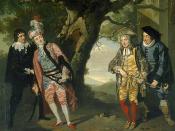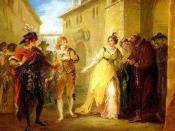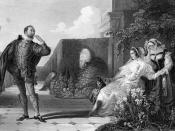A fool can be defined in many meanings according to the
Oxford English Dictionary On Historical Principles. The word
could mean "a silly person", or "one who professionally
counterfeits folly for the entertainment of others, a jester,
clown" or "one who has little or no reason or intellect" or
"one who is made to appear to be a fool" (word originated from
North Frisian). In english literature, the two main ways which
the fool could enter imaginative literature is that "He could
provide a topic, a theme for mediation, or he could turn into a
stock character on the stage, a stylized comic figure". In
William Shakespeare's comedy, Twelfth Night, Feste the clown is
not the only fool who is subject to foolery. He and many other
characters combine their silly acts and wits to invade other
characters that "evade reality or rather realize a dream", while
"our sympathies go out to those".
"It is natural that the fool
should be a prominent & attractive figure and make an important
contribution to the action" in forming the confusion and the
humor in an Elizabethan drama. In Twelfth Night, the clown and
the fools are the ones who combine humor & wit to make the comedy
work.
Clowns, jesters, and Buffoons are usually regarded as fools.
Their differences could be of how they dress, act or portrayed in
society. A clown for example, "was understood to be a country
bumpkin or 'cloun'". In Elizabethan usage, the word 'clown' is
ambiguous "meaning both countryman and principal comedian".
Another meaning given to it in the 1600 is "a fool or jester".
As for a buffoon, it is defined as "a man whose profession is to
make low jests and antics postures; a clown, jester, fool".
The buffoon is a fool because...


